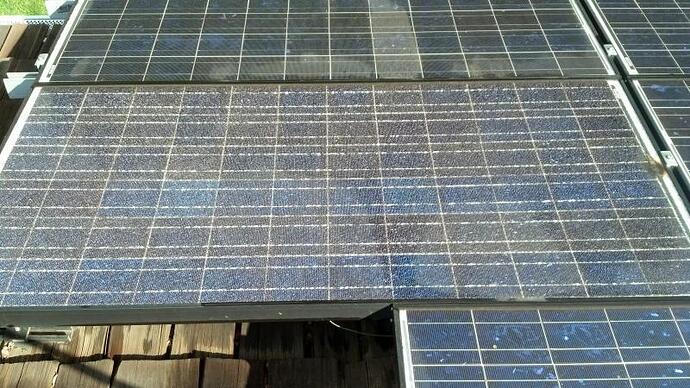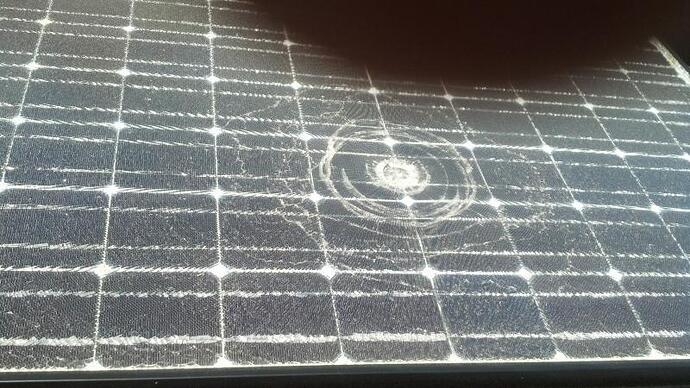Hi All: I’m cleaning the windows of a new client in about 2 weeks. I noticed she had 5 large solar panels on her garage. I have been itching to get into WFP solar panel cleaning. But I’m concerned about electrocution. The client is 88 years old and says they work fine. But is there anything I can self-diagnose about the system to check its operation? Also- I remember seeing something online about safety gloves you can buy when WFP’ing solar panels. I’m wondering if I should play it safe and not offer to clean them. Any guidance would be appreciated.
First off, welcome to the board. Now go and make a signature tag with company name, state and contact number like the rest of us.This way we all know who you are …I also thought about tackling solar energy panels as well, have a neighbor who recently had the side of his roof installed with them. There’s a lot of threads in here pertaining to the subject, do search for Solar Panel
Mr. Window: Been posting over the last few years. When I edit my profile there is no signature tag option. I can only put in my location. Perhaps it’s because I am not a member of WCR?
Honestly i don’t think you really have to worry about electrocution, wpf are a low pressure water , kinda like rain… they are on an external roof they are designed with weather in mind, other than that solar panels produce a 12 volt DC power from them and average panels are around 125 watts each. Even on a wet metal roof if you were somehow able to breach the tempered glass i doubt you would feel any ill effects.
If you have a fiberglass or hybrid pole, don’t worry about it. If you have metal or carbon, there is some risk. Wear protective gloves and or insulated boots, just to be on the safe side.
Eric Mettler
Mettler Maintenance Window Cleaning
Central Coast, California
www.mettlermaintenance.com
Wouldnt a hybrid pole introduce carbon fiber into the mix?
Not enough to be conductive (to my understanding)
For example, there is a warning label on the Gardiner SLX (full carbon) while there is no such label on the CLX ( hybrid)
Eric Mettler
Mettler Maintenance Window Cleaning
Central Coast, California
www.mettlermaintenance.com
I would also be cautious of the following. Homeowner installed panels that do not have the required permitting and inspection. Panels that are not installed by an qualified electrician. Panels whose wires droop down and touch the roof (they can wear and cause a hole in the wire). The worst thing would be to fall into the panels while doing the work. ZAP. Turning off the connection at the house will not change the fact that the panels are still producing electricity. The cut off only prevents the power from either entering the home for use or back through the power grid. If the sun is hitting the panels they are producing power no matter what.
Steve - you wrote solar panels produce 12 volt DC. That is true for small panels meant to charge car batteries or run portable 12V devices.
The actual output voltage of each panel depends on how much sunlight is shining on it, and how the individual cells in the array are interconnected. Typical output for a large 200-250W panel you will find on a house is 30VDC (38VDC if open circuit). That doesn’t sound too bad, but when there are multiple panels, quite often at least some are wired in series, which means the voltages add up. It is not uncommon in a large array of panels to have a potenial of 200+ VDC. The inputs of most inverters in these systems are rated for 600VDC. That being said, if the wiring is done to code and properly maintained, then it will not be a problem, even with a wfp.
I remember reading somewhere that its not the volts that hurt you, its the amps
Yes, it only takes a few milliamps through the heart to be fatal. It takes voltage to get a flow of current (analogous to water pressure to get water to flow). The higher the voltage, the easier to start a flow and the greater the flow will be. Flow will always follow the shortest path to complete the circuit.
So, just make sure you don’t provide a low resistance path through your heart. For example, never put one hand on one battery terminal with your other hand on the other battery terminal (on a 12V battery this would not likely prove fatal, unless you had bleeding cuts on both hands, in which case the the direct connection to your blood stream could provide a low enough resistance path for current flow through your heart). With the higher voltages found in solar panel arrays it is easier to create a lethal current flow, so just make sure the path through your heart is NOT the one of least resistance. Wear rubber soled shoes. Wear rubber/neoprene gloves. Either one will significantly impede the flow of electricity. Together they protect the two primary entry and exit paths to your body; your hands (on the wfp) and your feet (to ground).
The metal frames of the solar panels and any metal support structure should be electrically connected to ground, providing a much lower resistance path than through your body.
Another interesting fact to consider is that if you are using pure water (tds 000) it will not conduct electricty. It is the impurities in water that actually conduct electricity (your tds meter uses this principle to give you a tds reading). So the water coming out of your wfp jets as well as the plastic brush head and bristles are poor conductors, insulating you from panel (the dirty water running down the panel will be a much better conductor). Therefore, unless you have a conductive pole (aluminum or carbon fiber) AND are poking into the wiring under the panels enough to touch a bare ungrounded electrical power conductor (which should never exist) and are standing barefoot in a puddle of dirty water, I doubt you have much to fear.
This could be an interesting way to determine which pure water system REALLY creates the purest water! :eek:
80% of my business is solar panel cleaning. I use an alluminum wfp with no gloves or boots. I’m more worried about cracking a cement tile than I am about an electrical problem. But to be safe, don’t clean panels with broken glass. I have not gotten a straight answer from the install companies about that one.



